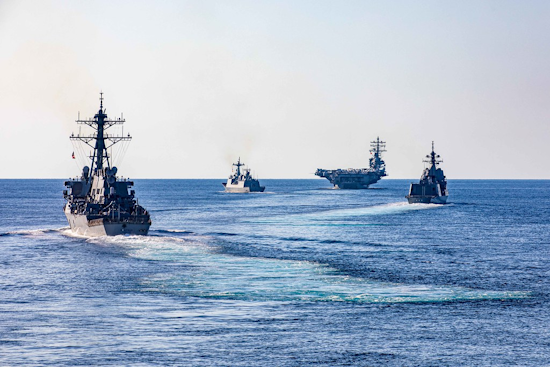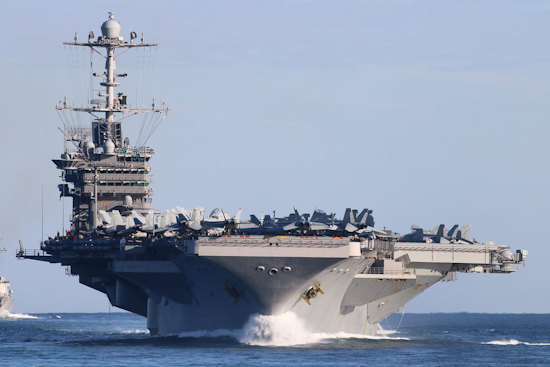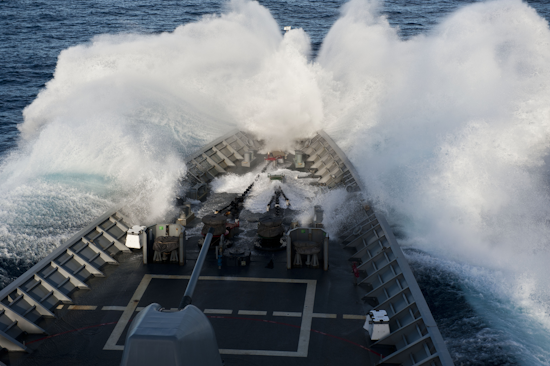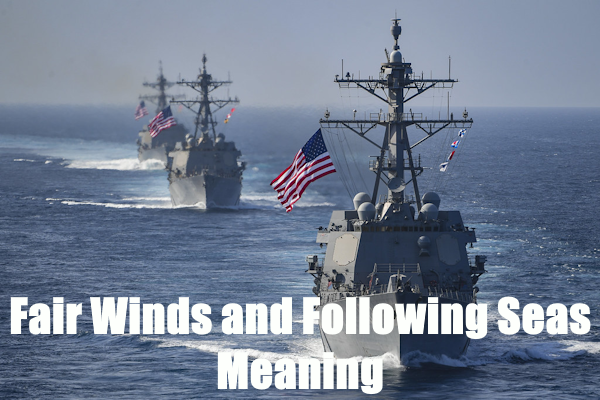What exactly is the meaning of Fair Winds and Following Seas?
The phrase is sometimes exchanged between friends or strangers, but does it serve any purpose?
“Fair Winds and Following Seas” originated as a military term and has evolved since then.
Learn more about the expression of speech and what exactly it means.
Related Article – What Is A Navy Squid? 11 Slang Nicknames For Navy Sailors
Table of Contents
What Is the Meaning of Fair Winds and Following Seas?

Have you ever heard the expression “Fair Winds and Following Seas” but had no idea what exactly it means?
You are not alone.
The expression may be a common military phrase for Navy sailors but many are left in the dark regarding its actual meaning.
In general, the idiom “fair winds and following seas” implies good fortune and safe travels.
Thus, it is comparable to wishing someone “farewell” or “Godspeed” as they embark on a new journey.
Additionally, many construe the expression of speech to suggest good weather, especially at sea.
In fact, many believe the term originates with the United States Navy (more information, below).
The phrase carries tremendous significance with the U.S. Navy because sailors often endured conflicts while at sea.
Thus, saluting a ship and gesturing goodbye with the expression is comparable to saying, “Good luck, travel safely.”
History of “Fair Winds and Following Seas”
The history of “Fair Winds and Following Seas” is very mysterious.
In fact, people continue to debate and interpret the meaning of the phrase differently.
Nonetheless, most agree that the term derives from the military and ship sailing.
In the past, sailors faced incredible challenges and dangers going to sea.
The globe was not nearly as well understood, and facing bad weather could result in a shipwreck.
For this reason, the oceans were not nearly as well explored, and being a sailor was a dangerous occupation.
When the United States Navy transformed into the most elite naval force in the world, they also adopted the slogan.
Today, the idiom continues to exist thanks to its connection to sailors and the U.S. military.
Those wishing for smooth sailing and a safe journey continue to utter the phrase whenever a ship is departing.
Origins
The idiom “Fair Wings and Following Seas” takes root from a simple meaning.
First, the words “fair winds” refer to how a ship benefits from how the breeze pushes the ship in the same direction as the current.
Thus, establishing an easier and smoother route of travel.
Secondly, the term “following seas” is more complicated but most interpret it to mean one wishes another to travel safely.
In sea navigation “following seas” usually implies that the waves are moving in the general direction as the ship, also indicating easy travel.
The nearest translation to the phrase would be “safe travel; good fortune.”
Some experts cite Herman Melville’s 1851 classic Moby Dick for coining the phrase.
Meanwhile, others acknowledge there is no single author who deserves credit for bringing the phrase to the high seas.
Related Article – Navy Aircraft Carrier Flight Deck Shirt Colors Explained
Fair Winds and Following Seas Variations

Today, there are many different variations of “fair winds and following seas.”
The general translation is that it means “farewell and safe travel.”
People use many other alternatives to imply the same thing:
- “Farewell, Godspeed”
- “Safe travels”
- “Best of luck”
- “Stay safe”
- “Drive responsibly”
- “Smooth sailing”
Those in the military continue to use the old-school term, while others incorporate more modern phrases that basically mean the same thing.
It’s important to wish someone well on their journey in the military because the risk of never seeing them again is often amplified.
Examples of “Fair Winds and Following Seas”
Here are a few examples of how the military slang is used in a sentence:
- “We’ll chat once you return, fair winds and following seas.”
- “Fair winds and following seas, my plane departs in the morning.”
- “Call me when you get there, fair winds and following seas.”
These are just a few examples of the way the phrase is used in a statement.
“Fair Winds and Following Seas” Poems

There are many poems that are attributed to the phrase.
However, a poem by Dave Kelly arguably stands above the rest.
It’s a poem designed to remember someone who has fallen or perished in military service:
Fair Winds and Following Seas
may forever you feel, upon your cheek, the salty breeze.
Your spirit lives on in many a heart,
your words captured and never to depart.
May your loved ones be comforted knowing
that heaven is where you are going.
For all that they have to do is look above,
and they will be reminded of your love.
Discover other popular military slang terms in the U.S. Armed Forces.
Related Article – Upside Down American Flag Meaning: 7 Things You Didn’t Know
Conclusion
What is the meaning of the idiom “fair winds and following seas”?
The origin of the phrase is unknown but many attribute it with military service.
The U.S. Navy was one of the first institutions to embrace the phrase as a method of wishing other sailors safe travels.
As a result, it’s also now a popular phrase to offer in passage to a close friend or during a toast at a party.
Fair winds and following seas, wherever life takes you!
- Replacing Dog Tags: 6 Things You Need to Know - June 28, 2024
- Navy OAR Test Study Guide - June 24, 2024
- 10 Best Sniper Movies of all Time - June 20, 2024


